
The next global crisis is already here—and it’s even worse than COVID
Imagine the horrors of coronavirus, compounded and made permanent. That’s climate change. Politicians who care about the future (ours and theirs) can’t wait to act.
If you ask Americans what they care about, the results aren’t too surprising. Over decades of opinion polling, the same combination of issues tend to occupy the most mindshare: jobs, education, crime, health care. The order shifts with the ebbs and flows of the economy, but it’s generally stable.
Of course, we weren’t expecting the typical answers when my consulting firm (which is helping to run Andrew Yang’s campaign for mayor) recently polled 800 likely voters in New York City. Nor were we surprised by the top issue chosen by a whopping 45% of respondents: COVID-19. One year ago, hardly anyone knew what coronavirus was. Today, it’s all that most voters care about. The next two concerns that appeared on our survey—crime (11%) and racial and social justice (8%)—weren’t even close.
The poll helps to explain what New Yorkers are looking for in their next mayor. But it also contains lessons for future politicians. When a crisis arrives, voters want something different from the usual political norms. And the mother of all crises is still ahead of us.
I’m not talking about another pandemic, although that remains a risk. I’m talking about climate change. A decade from now, COVID-19 will be a painful, distant memory, and a new, harsh reality will be setting in. In the west, raging wildfires and smoke-filled days. In the east, massive hurricanes and flooding shorelines. In some parts of the world, this new reality will mean you can’t go outside during certain times of day, because the heat is too extreme. In others, it will mean daily water restrictions because of droughts.
Συνέχεια ανάγνωσης εδώ
Plus
How to tell if a company’s ‘net zero’ goals are serious—or just greenwashing
Here are some questions to ask when a company says it plans to get to zero emissions.
The number of companies that have set net-zero climate goals—meaning that they’ll cut their CO2 emissions as much as possible, and any they still emit will be offset by projects that capture carbon—has more than tripled over roughly the last year. Nestlé, the world’s largest food company, says that it plans to reach net-zero emissions by 2050. Unilever, another consumer product giant with hundreds of brands, plans to get there by 2039. Duke Energy, the North Carolina-based electric utility with a long history of using coal, plans to reach net zero by 2050. Even oil companies such as BP now say that they are aiming for the same thing. Others, including Amazon and Microsoft, plan to hit the goal much sooner.
Συνέχεια ανάγνωσης εδώ
Πηγή: fastcompany.com




